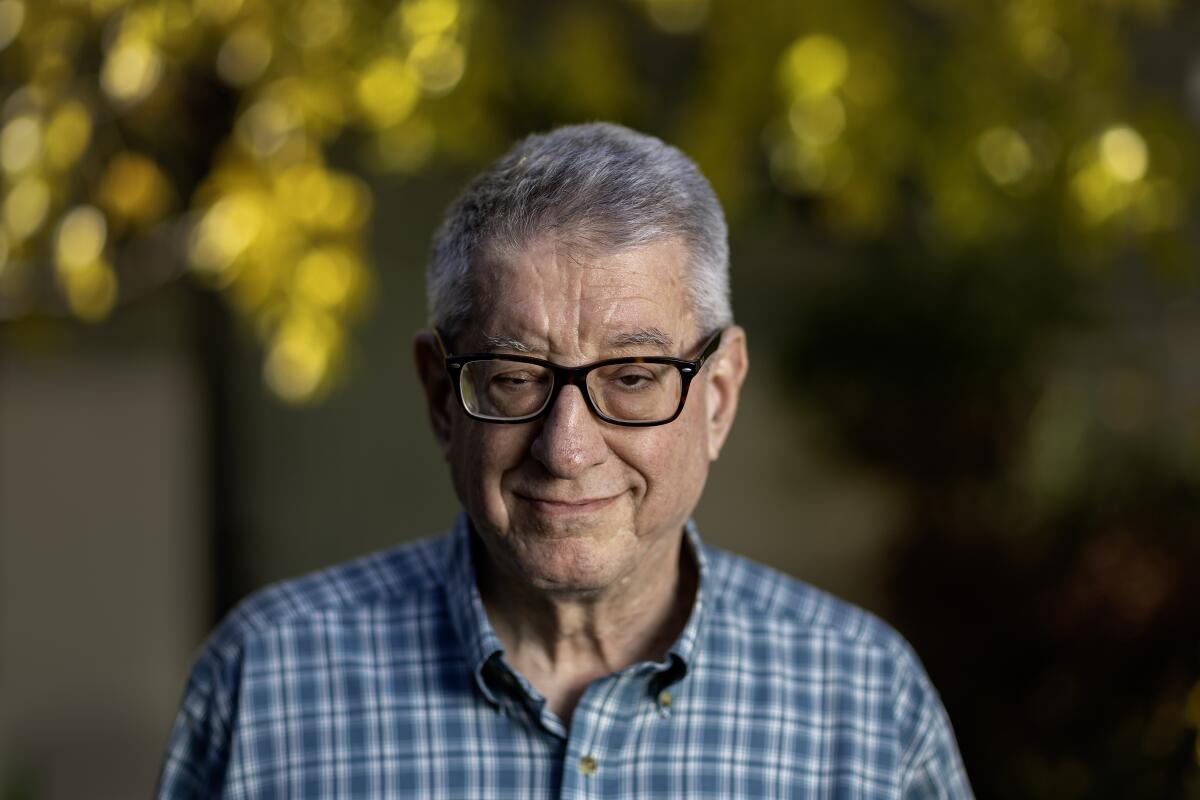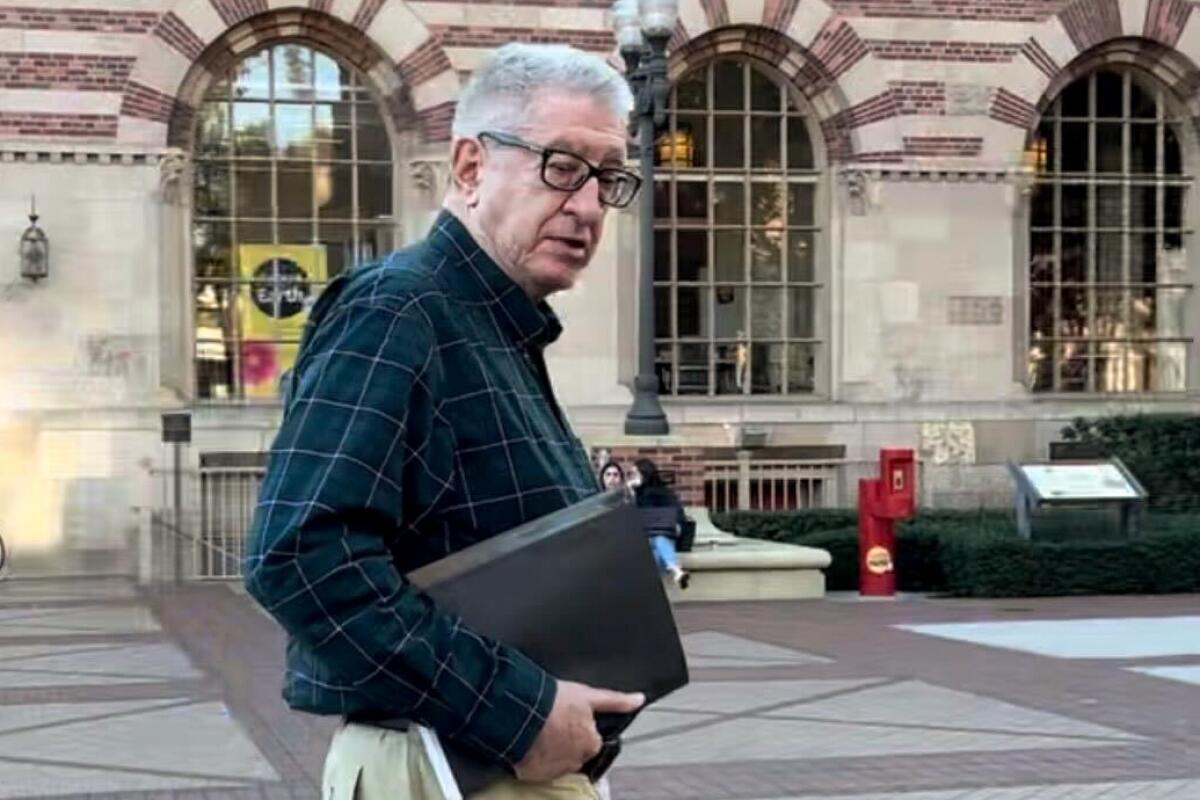USC drops complaints, won’t discipline professor who said ‘Hamas are murderers’

- Share via
In the weeks after Hamas attacked Israel in October, a confrontation between a Jewish USC professor and a group of pro-Palestinian students went viral and triggered a storm of controversy on campus.
Economics professor John Strauss told students — who were calling for a cease-fire and commemorating Palestinians slain in the war — “Hamas are murderers,” adding: “That’s all they are. Every one should be killed, and I hope they all are killed.”
Video of Strauss’ remarks spread rapidly online and led to a petition calling for the professor’s termination. More than 10 students also filed complaints against Strauss, accusing him of engaging in discrimination, harassment and fostering an unsafe environment.
This week, that long-running inquiry came to an end.
USC administrators informed Strauss on Tuesday that the case against him was closed, the complaints by students would be dismissed and that he will face no formal discipline, according to the professor and his attorney.
“I’m relieved,” Strauss said in a phone interview. “As far as I’m concerned, I’ve been fully exonerated and they’re not doing anything to punish me, and it’s over.”
His lawyer, Samantha Harris, said she was “frustrated that it took seven months to reach an obvious conclusion” that Strauss did not engage in harassment or discrimination.
“I’m nonetheless pleased that they reached the correct result,” Harris said.
USC economics professor John Strauss’ remarks about Hamas at a pro-Palestinian protest went viral, igniting debates about censorship, academic freedom and safety.
The Times presented USC with a summary of the findings about Strauss. The university did not dispute the findings, but also issued a statement saying it is “unable to discuss any individual cases because of the confidential nature of personnel matters.”
“USC takes allegations of harassment and discrimination seriously,” said the statement issued by the university’s press office.
The professor’s comments marked a flashpoint in clashes between supporters of Israel and Palestinians that have roiled American universities over the Israel-Hamas war. The Strauss episode was eclipsed by more campus turmoil after the university canceled a Muslim student’s valedictorian speech, called in police to dismantle a pro-Palestinian encampment and canceled the main graduation ceremony.
Some of the students who complained against Strauss were assisted by the L.A. office of the Council on American-Islamic Relations.
“We are disappointed that USC has found no wrongdoing despite the professor being captured on camera going out of his way to harass and intimidate USC students honoring the lives of innocent Palestinians killed by Israel,” Amr Shabaik, the legal director of CAIR-LA, said in a statement.
To reach the conclusion that Strauss did not violate university policies, a USC investigator interviewed the students who lodged complaints, witnesses and Strauss, according to the professor and his attorney. Strauss’ lawyer also said the investigator had video of the encounter — including the clips that had gone viral — and aerial footage from “Trojan Cam,” a live feed of the statue of Tommy Trojan on campus.
It was near that statue where students on Nov. 9 were staging a walkout calling for a cease-fire in the Gaza Strip and holding a memorial to Palestinian civilians killed in the conflict.
There were two discrete incidents in which Strauss was accused of wrongdoing that day.
The first occurred when about 200 students gathered in the center of campus for a “Shut It Down for Palestine” action. Some students chanted, “From the river to the sea, Palestine will be free.” Nearby, students had unfurled four long rolls of paper — at least 18 inches wide — across the ground, with thousands of names of dead civilians listed.
Strauss, who was walking across campus to teach a class, said he heard calls to destroy Israel and became angry: “I am Jewish and very pro-Israel, so I shouted, ‘Israel forever. Hamas are murderers.’”
He was accused of intentionally stepping on the paper commemorating the dead Palestinians.

Students told The Times last year that they felt threatened by an older professor in a position of power confronting them in this way and then “desecrating” the dead.
When the investigator pulled footage of this, however, it showed Strauss walking near the paper, but any contact was incidental, if it happened at all, Harris said, adding: “A reasonable viewing of the video makes clear it was not deliberate, if in fact anything was stepped on.”
The second incident occurred later that afternoon as Strauss was returning to his office after class. A student near the memorial yelled out, “Professor Strauss, shame on you.”
A cascade of decisions that Folt made this spring around USC’s commencement and Israel-Hamas war-related protests inflamed tensions and opened wounds, presenting the most significant test of her tenure.
Strauss replied, “No, shame on you,” adding, “You people are ignorant, really ignorant.”
A student in a gray Lululemon hoodie and black pants is heard telling Strauss that the event was to “pay respects” to those killed. A classmate wearing a red kaffiyeh wrapped around his head rushed over and inserted himself between the professor and the students.
Strauss, holding a file of papers in one hand and a bottle of water in the other, then told the students: “Hamas are murderers. That’s all they are. Every one should be killed, and I hope they all are killed.”
“I got that on video. Thank you!” a student is heard saying on a recording.

There was no dispute that Strauss said the words, but he denied that this amounted to a threat to students, as Hamas is deemed a terrorist organization and committed atrocities in Israel on Oct. 7.
Summarizing the probe’s findings, Harris said USC determined it had insufficient evidence that he was deliberately targeting any student and that his words — uttered in the span of less than a minute — didn’t create a hostile environment.
How USC’s controversial decision on Asna Tabassum’s valedictorian speech led to nearly two weeks of campus tension with 93 arrests and a canceled ‘main stage’ commencement.
“This was an exchange of opinions in a public area of campus on an issue of public concern that rose nowhere near to the level of conduct that constitutes harassment, which is severe, pervasive and persistent,” said Harris, referencing the formal criteria for evaluating harassment.
Although Strauss won’t face sanction by the university, his lawyer said that the length of the probe has been its own form of punishment.
“Living under a cloud for seven months is not nothing, and it has a chilling effect broadly speaking on faculty’s willingness to express themselves on matters of public concern,” Harris said.
Strauss was allowed to return to campus in December and continued teaching in the spring semester. This fall, he also has a full course load.
“I don’t have any regrets about what I did or said at all,” Strauss said. “I think it was perfectly reasonable.”
More to Read
Sign up for Essential California
The most important California stories and recommendations in your inbox every morning.
You may occasionally receive promotional content from the Los Angeles Times.













